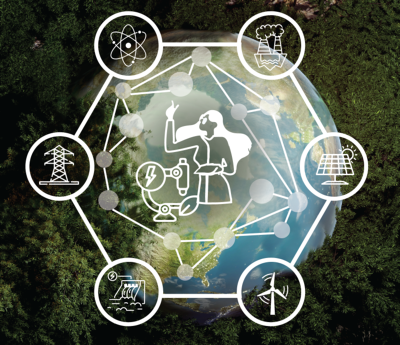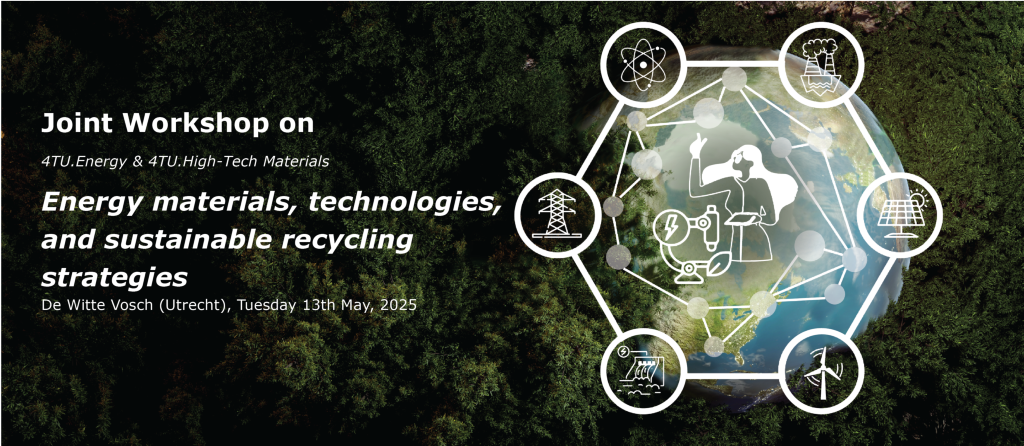Energy Materials, Technologies & Sustainable Recycling Strategies
Joint Workshop 4TU.Energy & 4TU.High-Tech Materials - 13 May 2025, Utrecht
This joint workshop with 4TU.Energy is targeted to early-stage researchers to meet and find their common ground on energy materials and sustainable recycling strategies; it is an opportunity to get together to share knowledge and explore collaborations.
If it is successful in content and organization, follow-up workshops on other topics or joint efforts on funding proposals can be expected.
Key topics
- Materials for Electrochemical Applications & Electrochemistry,
- Materials for Fuel Cells,
- Materials for Electrolysers,
- Materials for CO2 Capture & Conversion
Preliminary Program
Register now & stay tuned!
 Information
Information
- Venue: De Witte Vosch, Utecht
- Date: 13 May 2025 (10.00 - 17.00 hours)
Confirmed speakers
- Marta Costa Figueiredo (TU/e)
- Harry Bitter (WUR)
- Ian Gibson (UT)
- Shoshan Abrahami (TUD)
Soon, a full programme will be available.
Information - Confirmed Speakers/Presentations
Marta Costa Figueiredo (TU/e)
Marta Costa Figueiredo (TU/e)
Dr. Marta Costa Figueiredo is an assistant professor at the Chemical Engineering and Chemistry Department at Eindhoven University of Technology
Title: Material challenges in electrocatalysis – unravelling active sites
Abstract
Determination of active sites in electrocatalysis is a crucial aspect of understanding and enhancing the performance of electrocatalysts [1][2]. Active sites are the specific locations on the catalyst's surface where electrochemical reactions occur, playing a key role in determining the catalyst's efficiency and selectivity. Identifying these sites typically requires a combination of experimental techniques. Common methods include spectroscopic techniques such as X-ray photoelectron spectroscopy (XPS) and infrared spectroscopy (IR), which provide information on the chemical environment and electronic states of the surface atoms. Additionally, advanced microscopy techniques like scanning tunneling microscopy (STM) and transmission electron microscopy (TEM) can visualize the surface structure at the atomic level. Understanding the nature and behavior of active sites enables the rational design and optimization of electrocatalysts, leading to improved performance in various applications.
In this talk, I show some examples of our research on the challenges to understand and identify the nature of the catalytic site for several reactions of interest: CO2 electroreduction, Nitrate reduction and oxygen evolution reaction (OER).
References
[1] Bandarenka, A. S.; Koper, M. T. M. Structural and Electronic Effects in Heterogeneous Electrocatalysis: Toward a Rational Design of Electrocatalysts. J Catal 2013, 308, 11–24.
[2] Koper, M. T. M. Structure Sensitivity and Nanoscale Effects in Electrocatalysis. Nanoscale 2011, 3, 2054
Short bio
Marta Costa Figueiredo has been an assistant professor at the Chemical Engineering and Chemistry Department at Eindhoven University of Technology (TU/e) since April 2019. Her research focuses on electrochemical interface engineering and electro(catalytic) synthesis for sustainable processes and the production of high-value chemicals, including fuels and organic molecules, from waste substrates such as carbon dioxide and biomass. She has a PhD in Electrochemical Science and Technology from the University of Alicante, Spain. After completing her PhD in 2012, Marta was a postdoctoral researcher at various universities in Europe, including Aalto University (Finland), Leiden University (Netherlands), and University of Copenhagen (Denmark). From 2017 to 2019, prior joining TU/e, she was a Scientist at Avantium (Netherlands), working on the development and scale-up of CO2 electrochemical conversion technologies.
Harry Bitter (WUR)
Harry Bitter (WUR)
Prof. dr. Harry Bitter is full professor Biobased Chemistry and Technology at Wageningen University and Research
Title: Supported potassium carbonate and dual functional materials for direct air capture and conversion*
Abstract
Direct air capture (DAC) of CO₂ is one of the ways to lower the CO2 levels in the atmosphere. Here I will show how the performance of K₂CO₃ supported on carbon nanofibers (CNF) is influenced by the particle size of K₂CO₃ and the polarity of the carbon support. It will be shown that smaller K₂CO₃ particles enhance CO₂ adsorption efficiency. In addition a too high surface polarity—induced by oxygen-containing functional groups—has a negative impact on performance due to increased water adsorption. Lastly, the introduction of Ru into the K₂CO₃/CNF system creates active sites that temporarily retain CO₂ during CO2 desoprtion in H2 (as CO) on Ru sites (the CO2 desorbed to the gasphase in N2), allowing its subsequent hydrogenation to methane.
*with Freek Karaçoban, Torin de Groot, Tomas van Haasterecht
Short bio
Harry Bitter is full professor at Wageningen University and Research. He is holding the chair Biobased Chemistry and Technology. Within the chair he focuses on sustainable catalytic conversions and (extraction) processes on multiple length scales using a multidisciplinary approach. In his group he combines chemical (laboratory) approaches with computational approaches (from DFT to conceptual process design). Harry published about 220 papers, is involved in 5 patent applications, and teaches courses in (in)organic chemistry, catalysis, and biobased economy. In addition Harry is among others board member of the Royal Dutch Chemical Society (KNCV), chairman elect of the Dutch Research School on Catalysis (NIOK).
He studied chemistry in Nijmegen in the Netherlands with a major in organic chemistry and a minor in organometallic chemistry. Subsequently, he performed his PhD research at the University of Twente where he worked on Pt/ZrO2 based catalyst for the dry-reforming of CH4 with CO2 to syngas. After his PhD Harry joined the Utrecht University as junior staff member where he continued working in the field of heterogeneous catalysis focusing on the use of X-Ray spectroscopy in catalysis. From 1999-2013 he was a scientific staff member at Utrecht University in the group of Inorganic Chemistry and Catalysis. His research focused on the use of carbon-based catalysts both in fossil feedstock conversion and (later) in biomass-based conversions.
Shoshan Abrahami (TUD)
Shoshan Abrahami (TUD)
Dr. Shoshan Abrahami is an assistant professor at the Department of Materials Science and Engineering, Faculty of Mechanical Engineering at Delft University of Technology
Preliminary title: Recycling Strategies for Energy Materials
Ian Gibson (UT)
Ian Gibson (UT)
Prof. dr. Ian Gibson is full professor in Design Engineering at the Faculty of Engineering Technology and chair of Advanced Manufacturing, Sustainable products & Energy systems (AMSPES) in the Department of Design, Production, and Management (DPM) at the University of Twente
Title: Remanufacturing: a new challenge for AM
More information will follow soon.






